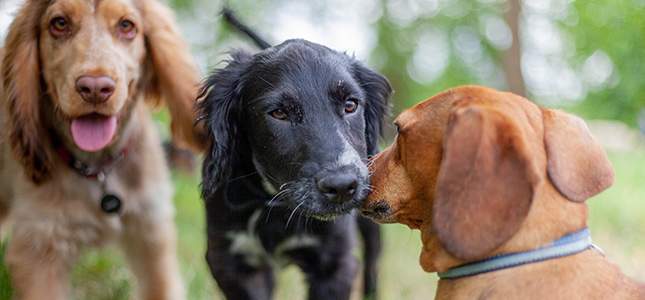
Everything You Need to Know About “Kennel Cough” Pneumonia
Kennel cough is a highly infectious respiratory condition which occurs in dogs mostly after they share airspace and contaminated surfaces with kennel cough infectious secretions. Symptoms and severity can vary greatly and is correlated with a dog’s age. Kennel cough can be life-threatening in very young or very old dogs.
What is kennel cough?
Kennel cough is the name given to a syndrome caused by viruses and bacteria with the main symptom being a hacking cough. The “kennel” component of the name stems from the fact that most dogs are infected in a group setting sharing airspace and surfaces. The name kennel cough is all-encompassing because multiple bacteria or viruses can cause the cough. The most frequent bugs are Parainfluenza virus and Bordetella bronchiseptica. In young dogs, viral infection can predispose the lungs to bacterial invasion and true pneumonia results.
Kennel Cough Symptoms
Kennel cough usually results in mild symptoms, mild or no pneumonia, and it resolves within 5 to 7 days. Severe symptoms in combination with poor appetite could indicate pneumonia, or inflammation and consolidation of the lung tissue, a complication of kennel cough.
This disease can be difficult to distinguish from pneumonia associated with canine distemper virus, which can attack the nervous system after causing respiratory signs. Young animals can also develop pneumonia because of an abnormal immune system or an inability to respond to an infection. Specific diagnostic tests can be required in these instances.
Symptoms of bacterial pneumonia in dogs may include a moist or productive cough, rapid respiratory (breathing) rate, nasal discharge, loud breathing sounds, malaise/depression, loss of appetite, and/or weight loss. These signs of illness and the presence of a moist cough for more than 2 or 3 days should prompt consultation with your veterinarian. Young animals in particular can become dehydrated easily because of a combination of fever and lack of water intake.
Kennel Cough Sound
Many pet owners are first alerted to a potential kennel cough because their dog produces different sounds than usual. A kennel cough sounds like your dog has something stuck in their throat and is trying hard to swallow. It resembles a hacking cough and your dog may emit a “honking” sound.
How is kennel cough spread?
Kennel cough is very contagious and can easily spread when dogs are in a group setting when dogs are sharing the same airspace. Adult, healthy dogs usually experience symptoms like a bad cough and runny nose for a few dogs, but kennel cough can be life-threatening in puppies and senior dogs.
Kennel Cough Treatment
A complete blood count (CBC) is used to evaluate the body’s response to infection by assessing the numbers and types of white cells present. The total number of white cells is usually increased in a dog or cat with pneumonia. Increased neutrophils (a type of white blood cell) are exposed when bacteria are the cause of pneumonia. Parasites or a hypersensitivity response can cause an increase in eosinophils (a type of white blood cell) and fungal infection usually results in increases in both neutrophils and monocytes (another white blood cell).
Your veterinarian may also elect to perform a blood chemical profile and urinalysis to make sure that the liver and kidneys are functioning properly prior to therapy.
Chest x-rays are always recommended when pneumonia is suspected. The x-ray pattern helps determine the most likely cause of pneumonia and also assesses the severity of the disease. Depending on the changes that are seen on x-ray and your animal’s general health, your veterinarian may recommend light sedation or anesthesia to obtain samples from the airway for culture and analysis. Airway sampling through a tracheal wash or bronchoscopy with bronchoalveolar lavage may be offered.
Most animals with pneumonia usually require initial treatment in the hospital. This is particularly true when your pet is dehydrated or requires oxygen therapy because supportive care is important in aiding resolution of pneumonia. In addition to these treatments, animals often receive “nebulization” and “coupage” therapy to remove excessive secretions from the lung and improve breathing. This type of therapy is achieved by supplying moisture-laden air to your dog or cat in a closed environment and then lightly tapping the chest with a cupped hand to loosen mucus. Sometimes this therapy is also required when animals are discharged from the hospital. Ultrasonic nebulizers can be purchased for home use from a hospital supply company or respiratory therapy unit.
Because the mechanical removal of mucus and infectious organisms is so important in animals with pneumonia, cough suppressants should not be used early in the course of disease because infectious secretions can become trapped in the airways and worsen pneumonia.
Kennel Cough Antibiotics
Bacterial pneumonia requires treatment with specific antibiotics that are directed against the organisms isolated from the lung. In severe cases, intravenous (IV) antibiotics are used, which then can be changed to oral medications once the animal’s clinical condition is improved. All antibiotics prescribed must be administered to your pet for the full course of treatment. Before stopping any medications, please consult with your veterinarian. Any medication used to treat pneumonia can be associated with side effects such as loss of appetite, vomiting, or diarrhea.
Kennel Cough Vaccine
There is a Bordetella vaccine which can help protect your dog from this bacterium. It’s administered either via injection or intra-nasally. It’s widely available and can help prevent the most common type of kennel cough. However, keep in mind that there are other types of bacteria and virus that can cause kennel cough, so it does not result in a 100 percent guarantee against kennel cough. For more information about the kennel cough vaccine, please consult your primary care veterinarian.